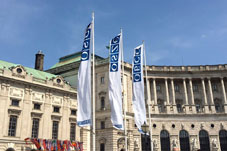
ODIHR Regrets Georgia's Decision Not to Invite Election Observers
By Liza Mchedlidze
Wednesday, July 9, 2025
The OSCE's Office for Democratic Institutions and Human Rights (ODIHR) expressed regret on July 7 over what it described as the Georgian authorities' "stated intention" not to invite an international election observation mission for the country's upcoming local elections, scheduled for October 4.
"ODIHR continues to stand ready to deploy an observation mission if the authorities decide to send a timely invitation," the statement said. The Office emphasized that such an invitation would be "in the interest of transparency and increased public confidence in Georgia's democratic institutions."
The Office described the government's position as a break from a two-decade tradition of inviting international monitors. "This is a departure from Georgia's longstanding and consistent practice over the past two decades," the statement noted. ODIHR told Civil.ge that it has received invitations to observe every local election since 2002, with the exception of 2014, when it was unable to attend due to budget constraints.
Georgian Dream Prime Minister Irakli Kobakhidze said on June 18 that it would be "unnecessary" to "burden" ODIHR with observing the municipal elections, arguing that such monitoring missions are typically reserved for "exceptional" cases. His comments followed a statement from the British Embassy in Georgia, which had encouraged the government to extend an invitation to ODIHR.
ODIHR first confirmed in mid-June that it had not received an invitation. At the time, it noted that invitations are ideally issued four to six months before election day.
In the same July 7 statement, ODIHR voiced "deep concern" about broader developments in Georgia, citing restrictive legislation, arrests of protesters, and the detention of opposition leaders. "We are following current developments in Georgia with deep concern, also in light of the recent arrests and convictions of opposition politicians," ODIHR Director Maria Telalian said. She urged the Georgian authorities to repeal laws that are "hindering the legitimate work of civil society."
"Civil and political rights are a lynchpin of democracy and the rule of law," Telalian added.
ODIHR said it is especially alarmed by the "arrests of dozens of protestors in recent months and reports of the lack of respect for fair trial standards," along with increased pressure on human rights defenders and civil society groups.
Meanwhile, Georgia's political opposition remains divided over participation in the October elections. On June 30, eight opposition parties announced a boycott, claiming that taking part would legitimize the ruling Georgian Dream party and undermine the resistance movement.
However, two opposition parties Lelo/Strong Georgia and Gakharia for Georgia, have confirmed they will participate. On July 5, Lelo reaffirmed its decision to run, saying the announcement had been planned prior to GD President Mikheil Kavelashvili's July 4 offer to pardon jailed opposition leaders if their parties agreed to compete. Lelo dismissed the offer as a political maneuver.
Six opposition figures remain in jail for refusing to participate in a Georgian Dream-led parliamentary commission, including Lelo leaders Mamuka Khazaradze and Badri Japaridze.
Lelo has identified the local elections as a key opportunity to challenge Georgian Dream's control, particularly in urban centers where opposition support is stronger.

